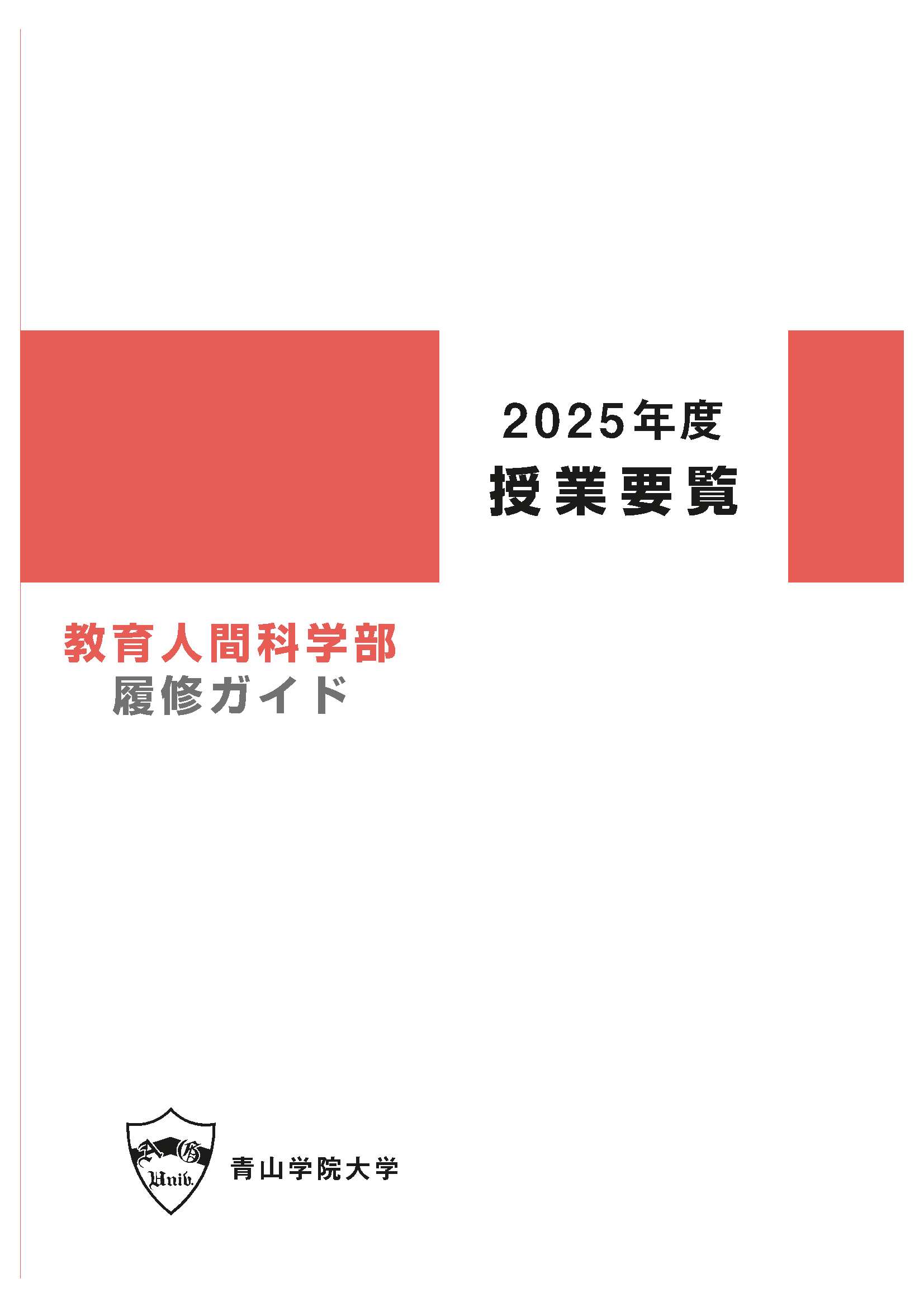- 2025年度授業要覧 教育人間科学部
学びの特色とカリキュラム(教育学科)
必修科目群(0群)
| 科目名 | 特長 |
|---|---|
|
教育学概説
|
人間の誕生から死に至るまでの成長と成熟に関する基礎概念、人間形成の理論と教育実践の関係などについて、人類史的視点、あるいは人間の文化の進化史という視点から考察します。また、情報化・国際化社会における教育、いじめ・不登校・教育格差・教育改革等様々な問題を取り上げ、それらの問題に対する教育学の基本的アプローチを提示し、教育学のいろいろな分野への入門的ガイドを行います。
|
|
教育学研究法
|
教育学分野における研究の意義・目的がどこにあるのかを考え、問題意識の設定、仮説の設定と検証、共時的研究と経時的研究、既存資料の収集と分析、文献研究、エスノグラフィックな研究、参与観察、アクションリサーチ、活動分析法、実例調査法、聞き取り調査、質問紙調査など、実際の研究に必要な知識と方法を習得します。
|
|
基礎演習Ⅰ
|
大学での学びが充実するように、専門的に学ぶ上で必要な基礎的な学習スキルを初年次から身につけます。教育問題を取り上げながら、文献の読み方、問いの立て方、情報収集の方法、レポートの書き方、プレゼンテーションの技法などを少人数授業で実践的に学んでいきます。学生自らが調べ探究するとともに、グループ学習やディスカッションを通じて相互に学び合う体験を重視します。
|
人間形成探究に関する専門科目群(Ⅰ群)
| 科目名 | 特長 |
|---|---|
|
人間形成学総論
|
教育学が、教育ではなくあえて「人間形成」という概念を使用することには、固有の利点と欠点があります。本講義では、人間形成という概念について基礎的知識を得ると同時に、それらがなぜ現在の教育学で好んで使用されているのか、そのことにどのような意味があるのかを、歴史的・社会的な視点から批判的に検討します。
|
|
宗教教育学
|
価値教育、あるいは宗教文化教育の視点から、世界の公教育における宗教教育の動向について教科書を中心に概観し、日本の公教育における宗教の取り扱いと宗教教育の位置づけを検討します。また、宗教的人間形成について、子ども中心の宗教教育と実存的な宗教教育との違いを考察し、教育対象に応じた教育のあり方を考えます。
|
|
家庭教育
|
「家庭は子どもが生まれて、親から適切なしつけを受ける最初の場である」。このような常識的な見方に対して、家族と離別して施設等で生活する子ども、親の育児放棄や虐待を受ける子どももいます。他方で、幼少期から子どもの教育に熱心な家庭もあります。この授業では、現代日本の家庭教育の多様性を考察しながら、望ましいあり方を考えます。
|
|
西洋教育史Ⅰ
|
もし著名な教育者の名前やその業績を憶えることにすぎないのであれば、教育学を学ぶみなさんにとって、教育史は無害な科目です。しかし教育を切り口として人間と社会の関係のありようやその歴史的変化を理解しようとするとき、教育史はみなさんの先入観を根底から覆す、きわめて危険な教育学になり得ます。勇気をもって、教育史の危険な世界にチャレンジしてみてください。
|
臨床教育・生涯発達に関する専門科目群(Ⅱ群)
| 科目名 | 特長 |
|---|---|
|
臨床教育学総論
|
私達は誕生後から様々な形で<教育>と関わります。「他者と共に社会の中で生きていく上で教育に何ができるか」「人間の幸せに教育はどう応えられるか」という問いを出発点に、子どもを取り巻く環境や社会文化的背景、教育をめぐる諸問題、保育・教育実践、保育者・教員の専門性など多様な視点から教育について探究します。
|
|
生涯学習概論Ⅱ
|
学び習うことは、若年期の学校教育にとどまらず、人生における様々な段階や場面へと広がっていきます。そういった生涯にわたる学びに関して、世界各国を比較検討しつつ概観します。具体的には、各国における生涯学習にあたるものを、社会経済情勢とも関連づけながら、紹介検討します。社会的話題となっている事項も、積極的に取り上げていきます。
|
|
特別支援教育A
|
個人のおかれた状況や障害の相違を踏まえつつ、障害児・者一人ひとりをどのように理解するかを通して、特別支援教育について学びます。受講者自らの、学校教育や地域などにおける障害のある人々との交流や共同学習の体験、テレビ番組や映画などの視聴や図書、雑誌、新聞などから得た知識や思い等と比較しつつ、現在の特別支援教育のおかれた状況、課題について議論します。
|
|
青年文化論
|
「今の若者は…」とよく言われますが、こうした批判は新たな価値を生み出す若者への憧れも込めて、繰り返されてきました。授業では、映像、小説、記事、調査などから、これまでの大学生が何を考え、何を求めてきたかを読み解きます。勉強、遊び、就職など身近な話題を取り上げ、学生同士の意見交換も交えて、今の自分を見つめ直してもらうとともに、社会との関わりや青年期の教育のあり方についても考えてもらいます。
|
教育情報・メディアに関する専門科目群(Ⅲ群)
| 科目名 | 特長 |
|---|---|
|
教育情報学総論
|
教育において、情報を受け取ったり、やり取りしたり、生成し発信したりすることは、重要な位置を占めています。学習者は受け取った情報をどのように理解し学習するのか、学習に利用できる情報はどのような形で存在しているのか、情報通信テクノロジーは学習にどのように利用されているのかなど、「情報」に着目して教育・学習の問題を考えます。
|
|
図書館情報学概論
|
図書館は“図書の館”ではなく、デジタルコンテンツを含む多様な情報の選択・収集、整理、保存、提供を行っている社会的なシステムであり、学習をはじめ、仕事、余暇などにおける情報活用の基盤です。情報利用者と情報専門職の視点も踏まえつつ、理論・実践の両面から現状・動向・課題・展望について考察していきます。講義を中心としつつ、ワークも取り入れます。
|
|
教材開発論
|
この授業を通して、受講生自身で教材を開発することをめざします。まず、道徳教育や国語教育における文献をグループで輪読します。その後で、新たな教材を作成し、その教材を使って実際に授業を行います。自分で考案した教材で授業をすることの楽しさ、そうした授業を受けることの楽しさを体験します。
|
|
視聴覚教育メディア論
|
視聴覚メディアの特徴と、それらを活かした教育のあり方について学び、考えを深める授業です。第一部「メディアとは何か」では、情報通信テクノロジーを含めたメディアの教育における役割を、第二部「種々のメディアの特徴」では、声・文字・画像・映像などによる様々なメディアとインターネットについて、第三部「メディアを利用した情報・理解・学習」では、情報の理解・学習や情報リテラシーなどを取り上げます。グループ・ディスカッションによる意見交換・議論も重視しながら進めます。
|
|
インターフェース論
|
人は他者、文化、社会、道具と関わりながら生活をしています。インタフェースとはこれらのものが関わり合う場をさす言葉です。インタフェースにおいては、メディアを介してさまざまなレベルでコミュニケーションが起きています。講義では、言語、コンピュータ、映像などの様々なメディアの特性を学ぶとともに、インタフェースを改善し、よりよいコミュニケーションを成立させる条件を考えます。
|
幼児教育に関する専門科目群(Ⅳ群)
| 科目名 | 特長 |
|---|---|
|
幼児教育原理A
|
これまでの保育の成り立ちと展開、いまの保育の課題をとらえ、保育の目的と意義、理念と思想、保育者など保育の基本的な知識を学びます。幼稚園・保育所・認定こども園の制度、保育の原理・方法・内容を歴史的な視点から理解し、幼小接続、特別支援、家庭・地域との連携、政策や改革の動きから、これからの保育を考えます。
|
|
小児保健論
|
保健学とは、健康を守り保つことに関しての学問です。成人と異なり、小児は常に成長、発達の途上にあります。そのため成長、発達、睡眠・消化・排せつなどの生理機能の基礎を学び、成人とは異なる「保健学」の理解を深めながら、生活習慣、親子や保育者とのかかわりなどについて、子どもの健康を促進する方策を学んでいきます。
|
|
保育内容教育法(表現A)
|
人は生まれたときから声という「音」を表現手段としてもっています。それがやがて子供の歌や音楽となる時、保育者に求められる役割や援助はどのようなものなのか、具体的事例を通して検討します。また、「幼稚園教育要領」における保育内容の基本的な捉え方や領域「表現」の歴史的変遷及び位置づけについて学び、多様な表現を生み受け取る心を育む保育について考え、理解を深めます。
|
|
臨床保育学A
|
乳幼児の<生活と遊び>が<発達と学び>に繋がるには訳があります。乳幼児期の発達・人間関係・つまずきや葛藤・保育者の援助・保護者支援などについて学び、自分の育ちの振り返りや事例の検討、グループディスカッションを通して、学んだ知識を保育・教育実践にいかす方法を考え、子どもの育ちに携わることを目指します。
|
児童教育に関する専門科目群(Ⅴ群)
| 科目名 | 特長 |
|---|---|
|
体育概説(運動)
|
「どうすればうまくいくのか」を試行錯誤しながら、あるいは工夫された場の中で楽しく活動しながら、設定された運動の目的を達成できる方法を自らが実践しながら考えていきます。また、心身の機能の面から、その取り組みが身体にどんな刺激を与えるのか、過負荷になっていないかなどについても、客観的かつ主観的に考えます。
|
|
図画工作概説(美術)
|
創造的な発想や構想、造形的な視点について理解を深め、表現・鑑賞の実技体験を通して美術教育のあり方について考えます。身近な物の観察と表現、色彩構成、フィンガーペインティング、版に表す活動などの実習を行います。
|
|
初等教科教育法(国語科)
|
小学校での国語科授業を担当できるように、「知識及び技能」「話すこと・聞くこと」「書くこと」「読むこと」の教材を研究します。教材研究に基づいて、学習指導案を作成して、模擬授業を行います。これらを通して、実践的な指導力の育成を目指しています。「読むこと」の教材である「スイミー」「ごんぎつね」「大造じいさんとガン」「すがたをかえる大豆」などで、授業の進め方を確かめた後に、自らが構想した授業を提案し、その改善に取り組みます。
|
|
学校教育学総論
|
教育改革が広まっています。その中で「成り行きの未来」と「意志ある未来」とが対比して語られます。この授業は、コロナ後のグレートリセット社会に備えて、受講生各自が学校教育の当たり前(成り行き)を見直し意志ある教育を考え・実践することを問い直す場です。意欲的な改革事例を感動的にそして批判的に検討します。
|
ACADEMIC CATALOG 授業要覧(科目一覧)
Q&A 教育学の学び
Q:教育学科では、 主に学校教育を学ぶのでしょうか。
A:教育学は、幅広い学問分野です。
教育は子どもや若者だけを対象にしているわけではありません。学校という場所だけで行われるものでもありません。家庭や社会の幅広いシーンで、生涯にわたって行われているものです。青山学院大学の教育学科カリキュラムは、学校における教育のことだけを扱ってはいません。教育学科で開設している教育学に関する科目は全部で200以上あり、乳幼児期から老年期に至るライフサイクルの中で、人間がどのように発達・学習・社会化・成熟していくかについて、多面的に学びます。また、人間が様々な学びを行うときに、どのような制度・環境・メディアを整えればよいかについて、実践的な力を身につけます。
Q:教員を目指しています。 どのコースを選べば良いでしょうか。
A:どのコースを選んでも、教員免許状や各種資格の取得を目指すことができます。
教育学科の科目は、教員免許状や各種資格を取得するための科目として用いることはできますが、履修コースの選択とは直接の関係はありません。どの履修コースを選んでも、教員免許状や各種資格の取得を目指すことができるようになっています。
青山学院大学の教育学科は、いわゆる「教員養成学科」ではありませんが、多数の学校教員を世に送り出しています。学校教員を目指す学生に対しては、教員免許状の取得に必要な科目にだけ目を向けることのないよう注意を呼びかけています。すなわち、教育学科で開設している幅広い様々な科目に関心を持ち、それらを受講することで、学校教員としての素養を高めることの大切さを伝えています。教員免許状の取得は、教員になるための手段であって、目的ではないはずです。質の高い学校教員になることを目指す学生を、教育学科は応援しています。
Q:教育学科では、教育職員免許状(以下、教員免許状) や各種資格を取得できるでしょうか。
A:はい、指定の科目を修得することにより取得が可能です。
卒業後の進路や興味・関心等に応じて、下の教員免許状や各種資格の中から選択し、指定の科目を修得することにより取得することが可能です。ただしその実現のためには、1年次から4年次まで、段階的、計画的に指定の科目を修得することが必要です。その他に、教育学科に配置されている「キリスト教学校」に関する科目などを中心に指定の科目を履修することで、大学としてそれらのプログラムの修了を認定する制度があります。なお、法令により、小学校および中学校の免許状取得には介護等体験が義務づけられています。
Q:教育学科を卒業すると、必ず教員免許状や 各種資格を取得することが可能でしょうか。
A:教育学科の卒業と教員免許状や各種資格の取得は、まったく同じではありません。
正確には、教育学科を卒業し、併せて指定の科目を修得すれば、教員免許状や各種資格の取得が可能です。学生の進路や興味・関心に応じて、教員免許状や各種資格の取得を選択できるようになっている一方、教員免許状や各種資格を取得しないで教育学を学び卒業することもできます。
実際には、いずれかの教員免許状や各種資格の取得を希望する場合がほとんどですが、教員免許状や各種資格を取得するためには、修得が必要な科目が増えるため、将来教員あるいは各種資格に対応する専門職に就くという具体的で明確な目標の設定が必要です。
Q:教育学科の科目と、教員免許状や 各種資格の取得に必要な指定の科目に、 関連がありますか。
A:はい、教育学科の科目には、教員免許状や各種資格の取得に必要な指定の科目が数多く含まれています。
教育学科の学生は、他学部・他学科の学生に比べて教員免許状や各種資格の取得が容易です。ただし、教育学科の科目と、教員免許状や各種資格に必要な指定の科目はまったく同じではありませんので、取得しようとする教員免許状や各種資格に応じて、教育学科以外に開設されている科目を修得することが必要です。
Q:教育学の専門性を深めながら、 教員免許状や各種資格も取得したいのですが、それは可能でしょうか。
はい、教育学科に開設されている様々な科目により教育学の専門性を深めながら、教員免許状や各種資格の取得を支援します。
1年次から教育学科の科目を履修すると共に、3年次から5つの履修コースに分かれ、教育学の専門性を深めます。また、教育職員免許状や各種資格については、1・2年次から進路などに応じて選択することとなります。教員を目指すのであれば、いずれかの学校種・教科の教員となるわけですから、学校種・教科を特定して教員免許状の取得を目指すことになります。各種資格についても同様です。

